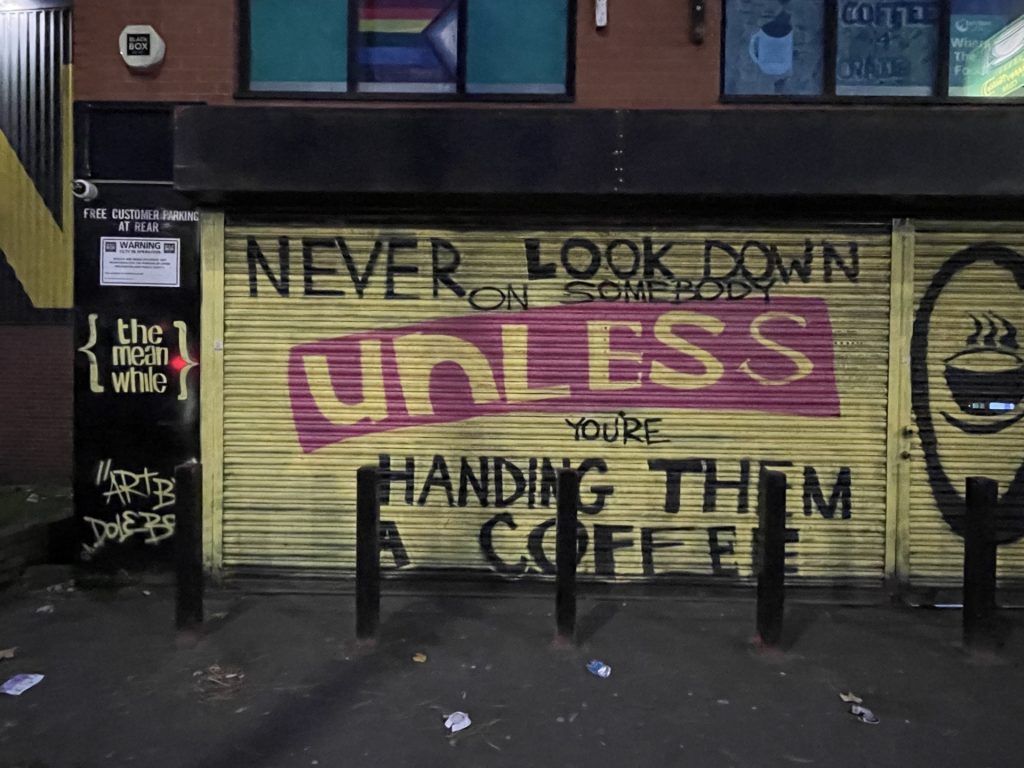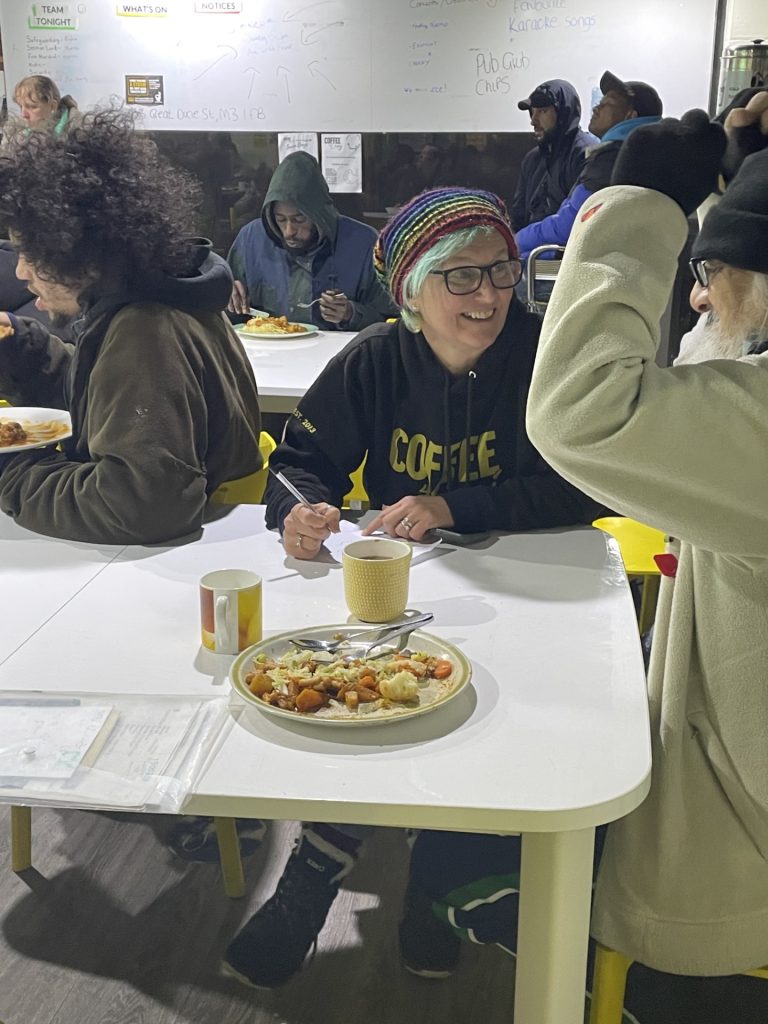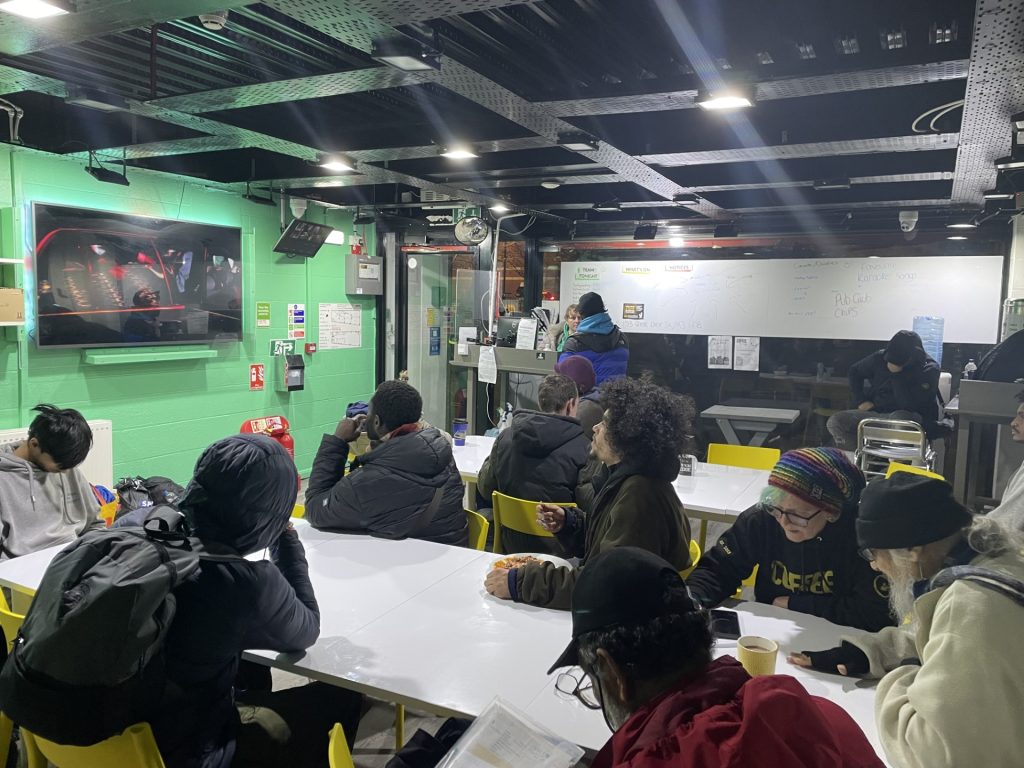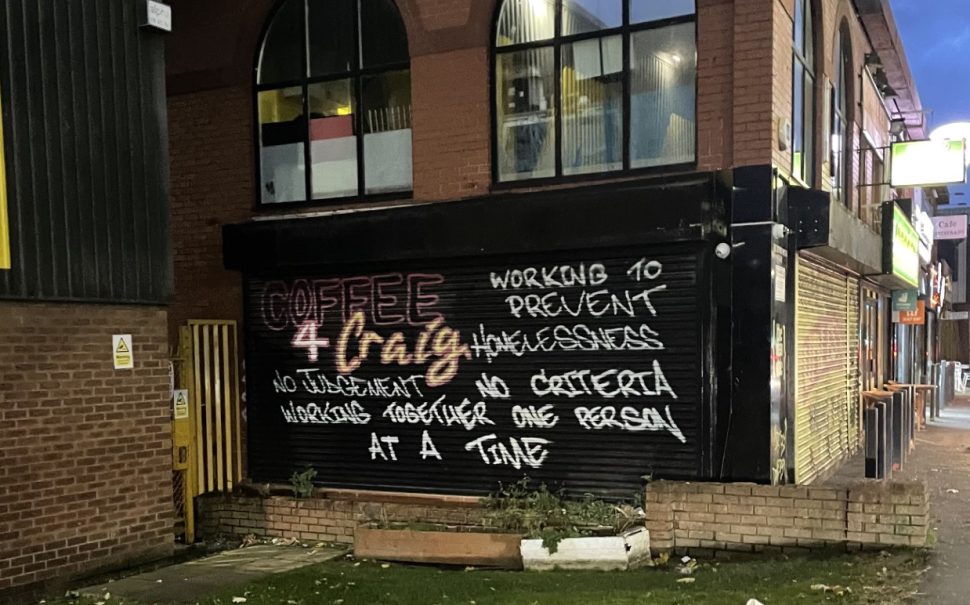Homelessness charities have seen a rise in the number of people using their service over the past couple of years – and the winter months are bound to be the most testing time of the year. Finn Toal volunteered with a Manchester charity to find out more.
The clock has just hit five, and the queue of homeless people is already winding around the corner outside Strangeways Prison.
Coffee4Craig is a charity established in 2013, when Craig White, the brother of founder Risha Lancaster, died due to a heroin overdose. Risha aimed to make the world a better place for those who find themselves on the streets.
And that’s what they do between 6 and 8 pm every night of the week. Those who find themselves in difficult times in Manchester can come down to their drop-in service as a sociable respite from the streets, to access hot cooked meals, showers, clean clothes and medical advice.
Based at Strangeways, it’s the only seven-night-a-week drop-in centre for the homeless in Manchester city centre. Coffee4Craig runs outreach programmes to raise awareness of homelessness.
It’s always been a personal mission for Risha, but its effects are huge. “I’ve always got Craig in the forefront of my mind,” she tells me, “and this is why we created what we did. Everyone deserves dignity, respect and non-judgement.
“You can’t judge anyone, as you’ve never walked in their shoes, and you don’t know what you’d do in their situation.
“All the volunteers know the staff, and they know me and my partner. We’ve stood on the cold streets with them, we’ve hugged people, we’ve cried with people. Everybody knows us and everybody trusts us.”
Homelessness has become all too apparent in Greater Manchester, and despite Andy Burnham’s A Bed Every Night scheme, the cost-of-living crisis has made it more difficult for those struggling to stay afloat.
Councillor Joanna Midgley, Deputy Leader of Manchester City Council, shared the council’s role in ensuring homeless people in Manchester access the right support needed. She said: “Support is available all year round to people on the streets and during the cold weather. These efforts are stepped up to ensure that people who are willing to come in out of the cold have somewhere safe to stay and are provided with the support they need to help them move off the streets and into secure accommodation.”
The cold and wet weather in the winter months are the most challenging times of the year for those finding themselves on the streets – as many of the 56 people at the session told me.
It was evident once people started making their way through the door that there was no judgment amongst those who found themselves on the streets and the volunteers. A sign read “Never look down on somebody unless you’re handing them a coffee”.

As soon as their meal was in front of them, they could then begin to utilise the services, whether that was just watching the film or chatting amongst themselves. Some of the people sought help from the volunteers and requested us to fetch new coats, socks or boxers that had been donated. Other people spoke to Risha in the hopes that there was temporary accommodation available, or even just a general chat about how they’re getting on. There was one person who needed new shoes – he showed me the holes in his current pair, which were constantly leaking in rainwater.
It was at this point that I spoke to Sandip, 67, who suffers from schizophrenia, post-traumatic stress and depression, and has been living without accommodation for the past 13 years.
Sandip recalled that he had been sleeping at a coach station for the last eight days after travelling up from Wolverhampton on the bus.
Sandip fell out of the housing benefit scheme due to his mental health. He couldn’t receive the correct support to reapply after being in hospital for a few months. “Because of my condition, I couldn’t handle life, and I struggle if I don’t get the right support. The landlord said you either pay me £3,500 or leave within 28 days, and the only thing I could do was go on the streets.”
That was at the age of 54, and Sandip has had to find new places to sleep ever since while dealing with his mental conditions. Following his eviction, he was pointed in the direction of a hostel but refused to go. “My younger brother died in that hostel, and I couldn’t go back to any hostel after that.”
It isn’t much of a choice between hostels with unhabitable conditions or staying on the streets, but the choice was clear for Sandip. “People have alcohol problems and drug problems in hostels. If you’re vulnerable and sitting in a hostel, they’ll hit you, threaten you, and push you around. There’s always fighting.”

Since staying at the station, Sandip told me of the difficulties he has so far experienced after being here. With a mug of tea in his hand, he recalled that he felt as if he had overstayed his welcome at the coach station and was starting to feel unsafe there. Optimistically, he told me: “I’ve hopefully got a place to stay tonight. I think the council will be putting me in a hotel. We just have to wait and see. I’m waiting for them to call me to see where they’ll place me tonight.”
For another of the service users, Brian, the change in the weather is starting to take a toll. He found himself homeless over a year ago after falling out with his parents, and that grudge still hasn’t been amended.
Tucking into his hearty portion of chicken tagine and rice, Brain agreed to share his experience – on the condition that I refill his milky coffee with two sugars. After a nod of approval for the quality of the brew, and a few shared insults on Manchester United, he put his meal on the back burner and opened up.
Brain started to recall that since being on the streets, he specifically looks for buildings next to car parks: “There are cameras in there, I feel quite safe. You’ve got to sleep somewhere with cameras. It’s difficult because when you got to go places to sleep, you’re getting banned from there.”
The strong winds from Storm Ciarán were battering Manchester that night and remained as a reminder that the winter season was kicking in. When asked how he deals with the weather, Brian added: “It’s starting to get freezing now. I’ve had a blanket and I’m still cold, no socks and wet shoes. I’ve got a sheet around me, but I’m still cold. It’s bad out there.”
With the days now going dark at four o’clock, and the temperatures plummeting as a result, it becomes increasingly difficult for those without a residence to keep themselves warm at night. This then puts added strain on charities such as Coffee4Craig to provide guests with warmer clothes with the increase in people using the charity.

Risha agreed: “It is more difficult in the winter, but it’s incredibly difficult throughout the year as the trauma that they’re going through with homelessness is still there.”
The cost-of-living crisis has made it more difficult for people, and that reality became all the more apparent when one volunteer disclosed that Coffee4Criag has seen 3000 more people step through their door this year, in comparison to last, as “people are coming to us deciding between food, fuel or rent.”
The week before I volunteered at the drop-in session, the ex-Home Secretary, Suella Braverman, controversially referred to homelessness as a “lifestyle choice”, defending her proposal of clamping down on tents causing a nuisance in urban areas.
Risha rationalised the “ridiculous” comment made by Braverman.
“You have to have a choice in the beginning,” she said – a choice that isn’t provided by many of the shelters available to people on the brink of homelessness.
“I have seen a lot of places where it’s just not fit for purpose, where they’re not dignified, warm, or clean. Some places might have facilities which aren’t inhabitable. I wouldn’t send my worst enemy there.
“They might choose to be on the streets, which can be safer in comparison – but what sort of choice is that? That’s not a choice.”
As the evening wore on, people started filtering slowly out of Strangeways, full of appreciation for the meal and support they received before finding a place to settle for the night. People requested takeaway boxes to fill with any leftover food from the service to ensure there was another meal for them when they woke up. As they went on their way, the volunteers wished the homeless well and assured them to look after themselves as the night began to draw colder and wetter.
But Sandip, whose brew I’d topped up a couple more times, lingered until he was the last person there, glancing every so often at his phone.
His phone was poised next to him, to see if he had missed a call. He waited all night fixated for Manchester Council to call him back with a temporary room for the night. But the call from the council never came, meaning there was no bed for Sandip after all. He had to return to the coach station that night, regardless of the situation there, as he had no choice.
Cllr Midgley gave a positive update on Sandip’s situation following the day I spoke to him: “Our records show that we tried to get in touch with Sandip, but we were unable to contact him.
“However, since then we have been back in touch, and we have placed him in supported accommodation run by one of our commissioned providers.”




